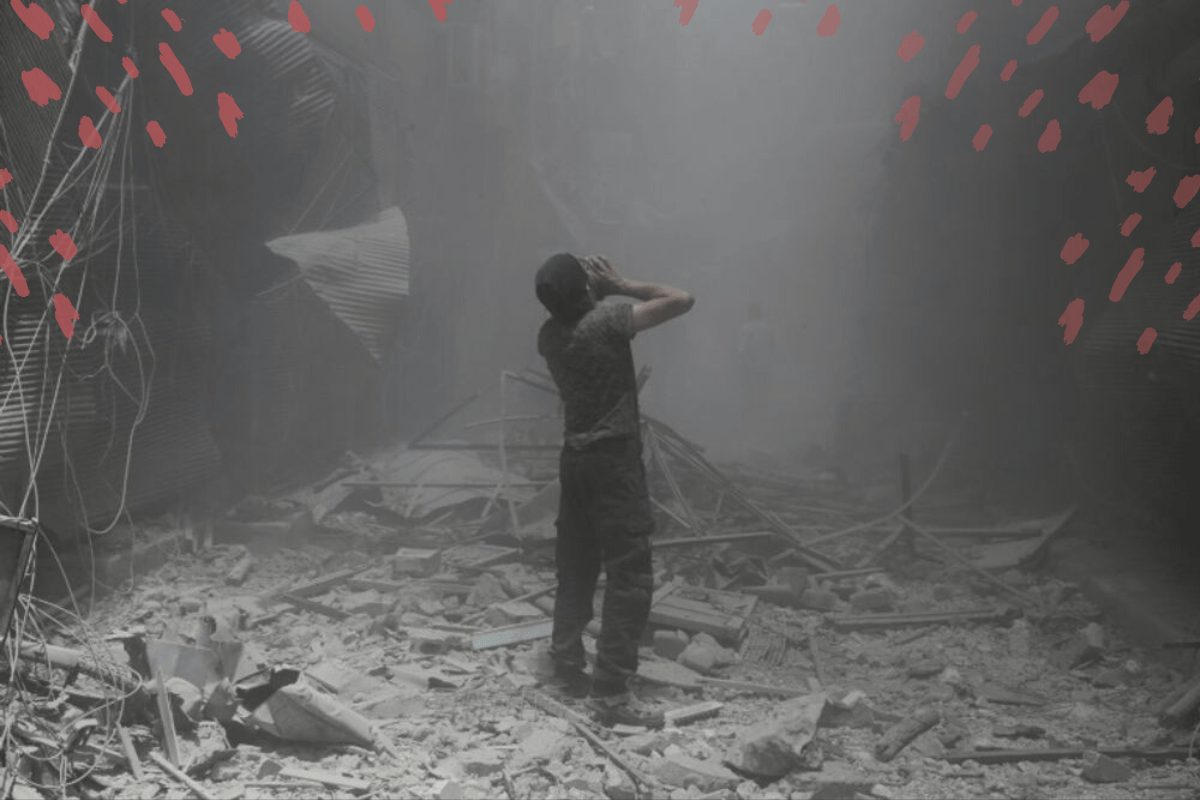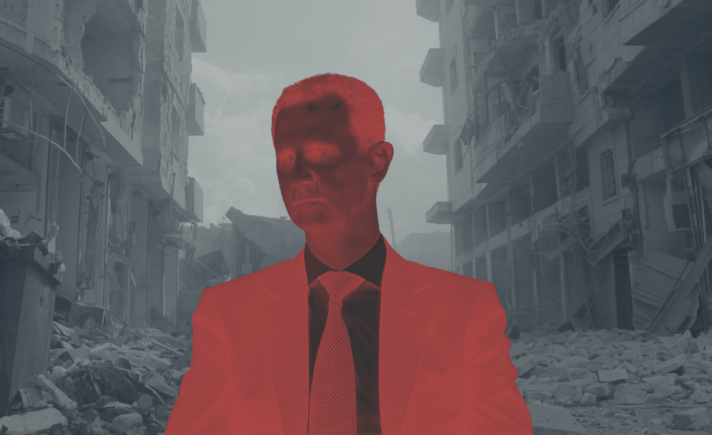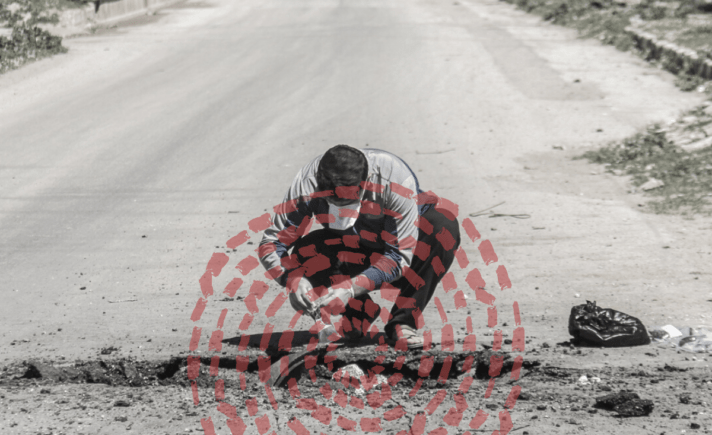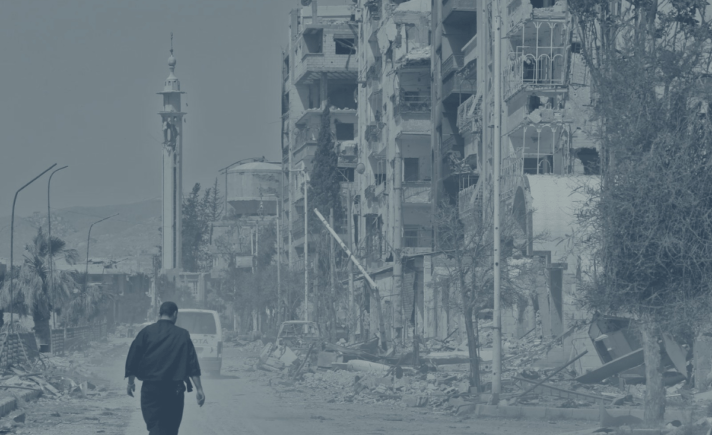A chemical attack has struck. The people of Zamalka and Ain Tarma lie dead in their streets.
The muezzin’s voice echoed through the streets of Kafr Batna, filled with sorrow and urgency. It was two in the morning when his announcement issued from the minarets, his voice breaking with emotion and intermingled with calls to prayer.
That night, darkness was replaced by chaos. The streets buzzed with activity: sounds of distress calls and intermittent calls to prayer mixed with the muezzins’ cries for help, pleading for assistance to evacuate civilians and for supplies like clothes, vinegar, and soft drinks to be sent to hospitals. We were unprepared and inexperienced in dealing with such toxic gasses; these simple items were our only means of first aid, but the demand far exceeded what our health facilities could handle.
Before we even heard the muezzin, Fatima, our neighbor’s daughter from Zamalka, arrived at her family home. She was in a state of shock, crying and coughing loudly. When her father inquired about the rest of their family, her reply was chilling: “They’re dead… they’re all dead.”
Following this horrifying revelation and the mosque’s initial call for aid, my father didn’t hesitate. He rushed out to help, using his large pickup truck for the ambulance services, capable of transporting more people than ordinary vehicles. Meanwhile, I quickly got ready, anxiously waiting for my fiancé, a paramedic, to take me to my job at al-Fateh Hospital in Kafr Batna. As I waited, nerves set in, and my mother, beside me, wept, her thoughts with my brothers who were still outside. An hour and a half passed before the ambulance finally arrived to take me.
As we left our house and made our way to the main street, the sound of shells and missiles filled the air. It felt like a race against them as we hurried along. I couldn’t believe what was happening, and my only focus was reaching the hospital. Danger was everywhere, and I had to get there to fulfill my duty.
My fiancé was driving at breakneck speed, seemingly in a state of shock. While I couldn’t quite understand his behavior, it was clear he wasn’t fully aware of his surroundings. I thought he must have been traumatized by the horrors he’d seen – I didn’t know that he had also been exposed to sarin through the clothing of the injured he’d treated.
The journey to the hospital, which I usually made on foot, felt endless. As we arrived on Hospital Street, located at the town’s edge, I saw burning tires lining the street, and cars shuttling back and forth transporting the injured and the deceased. I rushed out of the car, only to witness one of the most harrowing scenes I’ve ever seen: scores, maybe hundreds, of people injured, lying in the street and in the hospital’s outer courtyard. Nurses and civilians worked together in a poignant display of unity, sorting them into categories of injured or deceased.
Outside the hospital, water tanks were busy washing sarin off the injured and those assisting them.
The injured resembled fish out of water, twitching and convulsing, with white foam at their mouths and eyes with constricted pupils.
I, along with most Ghouta residents, including medical professionals, were witnessing these symptoms for the first time. A doctor later shared that despite studying toxic gas symptoms, he had never seen anything like this. The shock was immense, but there was no time to process it; immediate action was necessary.
I tried to enter the hospital, but it was a challenge due to the sheer number of injured. I carefully stepped over them, fearful of causing further pain to those who were conscious. Inside, the situation was even more dire. Twice as many people as outside filled every available space – the ambulance bay, operating rooms, radiology, and even the narrow corridors. Injured and deceased individuals, predominantly children and women in nightclothes, filled the hospital. Their lives had been cut short, most likely while they were asleep.
I thought, did they feel anything before they passed away? Did they hurt?
My focus was abruptly broken by my colleague Walaa’s voice calling out to me in the ambulance department. As I approached her, I could see the exhaustion in her face. Her pupils were pinpoint, just like those of the people outside, a sure sign of sarin exposure. The change in her appearance was alarming, and for a moment, reality seemed to slip away from me.
I asked her, “Are you okay?”
She replied, “I’m fine, but the first responders who treated the initial wave of victims were badly affected. Many are in intensive care or hospitalized now. Here, take these atropine needles and administer them to each person affected.”
As I gave injections and provided first aid, I caught sight of my fiancé staggering near the hospital entrance. Something was clearly wrong with him, but I couldn’t spare a moment to check. Within a minute, I heard a loud thud and people shouting, “He’s collapsed… come quickly”. My fiancé had succumbed to the sarin exposure from treating the injured. He was swiftly taken for medical examination, and I was overwhelmed with worry: Will he survive? I urgently informed the doctor of his asthma, seeking some reassurance. The doctor urged his transfer to intensive care, leaving me torn between staying by his side or continuing my duties.
Despite my distress, I carried on with my work, sneaking away to intensive care whenever I could to check on him, fearing he might have joined the many who had already passed away. We began marking the patients with numbers for identification.
It was now six in the morning, and our efforts were still ongoing. One of the doctors instructed me, “Nour, document everyone in the women’s department upstairs.” I went to record the names of the women there, wondering with each name I wrote: Has she lost family members? Do her loved ones know she’s here?
Families were torn apart as the injured were rushed in different vehicles to various medical centers.
I noticed a young woman, probably about twenty, in one of the rooms. She was twitching and convulsing from suffocation. When I approached and asked her name to check her consciousness, she could only respond by gripping my neck tightly and shaking me, repeatedly saying, “Rawaa, Rawaa… My name is Rawaa”. Struggling to breathe under her grasp, I saw the desperation in her eyes, begging for relief from her agony. Her tearful, terrified expression is still etched in my memory. As I tried to gently free myself from her grip, fearing I might hurt her even though she was hurting me, a colleague came to assist.
I was aware that many patients might experience violent panic and asthma-like symptoms due to their difficulty breathing, but the reality was far more intense than I could have imagined.
By eight in the morning, the sound of an airplane in the distance marked the continuation of the Assad regime’s atrocities. It seemed intent on targeting the survivors, with the hospital as its destination. A missile exploded near the hospital entrance, causing extensive damage and exacerbating the toll of the chemical attack.
Schools, mosque courtyards, and warehouses were transformed into makeshift care centers for the injured and deceased, many of whom could only be identified by photos and numbers marked on their foreheads.
Exhausted, I returned home, feeling like a lifeless shell, haunted by cries, images of foam at the mouth, convulsions, and eyes with pinpoint pupils.
Upon entering, I was anxious to check on my family, whom I had not heard from since the previous night. My mother immediately informed me that my father was unwell. I found him in his room, motionless, his forehead covered in sweat from the intense heat, his face red and congested with profound sadness. His clothes caught my eye; they were the same he had worn when we went out to help with the ambulances. That day, he had returned home exhausted, fallen asleep still covered in traces of sarin, oblivious to the danger. Minutes later, he was rushed to the hospital for observation.
I seized the opportunity to check on my fiancé, slipping away to the intensive care unit. The nurse there reassured me that he was out of danger, though his phone was incessantly ringing. I stepped onto the balcony with his phone to ensure a clear connection. The calls were from his family in Damascus. His uncle rang – whom I don’t speak to, knowing his stance from our revolution and the epithets he uses against us. He asked sharply, “Why aren’t you answering, you idiot? Your mother is worried sick.” When I explained that my fiancé was hospitalized due to sarin exposure, his uncle’s reaction was shockingly dismissive: “Stop lying and acting, you traitors… You’re destroying the country.” Then he hung up. His words stung deeply, the denial of the sarin attack almost as hurtful as the attack itself. It baffles me how people, just a short distance away, could accuse us of fabricating such a tragedy. Even a slight breeze that night would have carried the effects of sarin, resulting in dozens of victims from Ein Tarma and Zamalka being rushed to hospitals.
These denials became more frequent, but we learned to ignore them.
The days following the massacre were incredibly tough. Each day, as people came to identify a martyr or to collect an injured family member, the emotional scenes would bring us right back to the horror of that ill-omened day.
During those difficult days, a young man in his twenties, accompanied by his mother, came to the ambulance daily. He had mild shortness of breath and a slight fever, symptoms that puzzled me. He was past the critical stage and could have been treated at home. When I inquired about his profound sadness and tired appearance, his mother revealed that he was a newlywed who had lost his wife in the chemical attack. His grief was affecting him more deeply than the sarin itself.
The harsh memories of those times haunt me as I try to sleep. I recall a young man who stayed with our neighbors. He had survived the sarin exposure that night but was still disoriented and unaware of his surroundings. He would sit by the window in a stuffy room, emitting loud, bizarre sounds, sometimes breaking into loud cries or episodes of vomiting. His distress was so intense that it often led me and others in the neighborhood to prolonged bouts of crying. He remained in this state for a week until his parents arrived and took him home.
The month of August still brings me fear and loathing; its hot nights rob me of sleep. In my dreams, I’m haunted by the spirits of the martyrs and the injured, their voices and faces lingering in my mind. Rawaa’s face is etched in my memory. She was a survivor of the massacre, but I don’t know if she made it through the subsequent bombings and attacks before we were forced to leave Ghouta. In our displacement, as before, we persist in our call for justice – for the stolen childhoods, the battered bodies and souls, and the countless lives lost.





